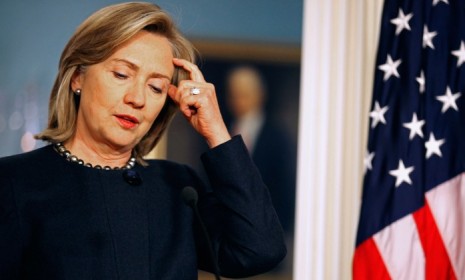WikiLeaks' 'cablegate' dump: 10 biggest revelations
Which Arab countries want the U.S. to attack Iran? Who may have been spying on the U.N.? And which world leader was described as a "flabby old chap" by U.S. diplomats?

A free daily email with the biggest news stories of the day – and the best features from TheWeek.com
You are now subscribed
Your newsletter sign-up was successful
WikiLeaks, the vigilante whistle-blowing site, has disclosed the contents of over 250,000 diplomatic cables from U.S. embassies to countries around the world. The White House warned that the exposure of highly sensitive documents could "deeply impact not only U.S. foreign policy interests, but those of our allies and friends around the world." The site itself has so far published only 220 cables, but it has shared information from the entire cache with several newspapers and magazines. Der Spiegel, one of the chosen few outlets, described the leak as "nothing short of a political meltdown for U.S. foreign policy." Here are some of the key revelations:
1. The Saudi King pressed for a U.S. attack on Iran
King Abdullah, the aging ruler of Saudi Arabia, has repeatedly urged the U.S. to attack Iran—"cut off the head of the snake"—and destroy its nuclear facilities. It's not just Saudi Arabia, though. According to the cables, leaders in Israel, Jordan, and Bahrain have also called for military action against Iran.
The Week
Escape your echo chamber. Get the facts behind the news, plus analysis from multiple perspectives.

Sign up for The Week's Free Newsletters
From our morning news briefing to a weekly Good News Newsletter, get the best of The Week delivered directly to your inbox.
From our morning news briefing to a weekly Good News Newsletter, get the best of The Week delivered directly to your inbox.
2. Iran may have North Korean missiles
The Islamic nation reportedly obtained missiles from North Korea capable of attacking Russia and Western Europe. Iran is said to have 19 North Korean BM-25 missiles, and officials warn the rockets might give Tehran "the building blocks" to build larger, long-range missiles on its own.
3. The U.S. is in a nuclear standoff with Pakistan
The U.S. has been trying to remove highly enriched uranium from a Pakistani research reactor for three years, fearing it could end up being used in a nuclear device. Pakistan has so far refused to grant access, as its officials worry that local media would portray the move "as the United States taking Pakistan's nuclear weapons."
A free daily email with the biggest news stories of the day – and the best features from TheWeek.com
4. The U.S. has been secretly bombing Yemen
The U.S. has launched covert missile attacks on terrorist targets in Yemen. But in a meeting with Gen. David Petraeus, Yemeni president Ali Abdullah Saleh says "we'll continue saying the bombs are ours, not yours." These air strikes killed several civilians, says Justin Elliott at Salon, and this revelation may yet "spark a backlash against Saleh."
5. China has been cyber-attacking Google, the Dalai Lama
The cables confirm that Chinese cybe-terrorists were behind an intrusion into Google's computer systems last year. The attack prompted Google to withdraw from the country in March 2010. Chinese hackers have also broken into the U.S. government, businesses, and even the personal computer of the Dalai Lama, according to the leaked cables.
6. Hillary Clinton has reportedly 'spied' on the U.N.
The secretary of state issued a classified directive ordering U.S. diplomats to gather information on the leadership of the United Nations, including credit card numbers, DNA, fingerprints, and iris scans. Officials targeted included U.N. Secretary General Ban Ki Moon and representatives from China, Russia, France, and the U.K. This may violate international treaties, suggests The Guardian.
7. Silvio Berlusconi and Vladimir Putin have a special relationship
The friendship between the Italian and Russian prime ministers goes even deeper than previously thought, reports The Guardian. Cables detail the exchange of "lavish gifts," deals over lucrative energy contracts, and "the use by Berlusconi of a 'shadowy' Russian-speaking Italian go-between."
8. Afghanistan VP carried $52 million in traveling money
When Ahmed Zia Massoud, Afghanistan's vice president, made a trip to the United Arab Emirates last year, he was discovered to be in possession of $52 million in cash. In a cable, the American Embassy in Kabul confirmed Massoud was allowed to keep this "significant amount" without explaining why or how he came to be carrying it. Massoud denies carrying the cash.
9. The U.S. bartered with Guantanamo prisoners
The State Department was so desperate to empty Guantanamo Bay that it attempted to barter with various countries to take prisoners. Slovenia was told it might receive a visit from President Barack Obama if it accepted detainees, and the island nation of Kiribati was offered millions of dollars in incentives to accept Chinese Muslim prisoners. American diplomats suggested taking in prisoners would be "a low-cost way for Belgium to attain prominence in Europe."
10. World leaders aren't exactly treated with deference
The cables include a number of "diplo-disses," says Emily Rauhala at Time. Kim Jong Il, North Korea's dictator, is labeled a "flabby old chap" by one source. Berlusconi is "feckless, vain, and ineffective as a modern European leader." Zimbabwean leader Robert Mugabe shows "deep ignorance on economic issues," and the American embassy in Moscow refers to President Dmitry Medvedev playing "Robin to Putin's Batman."
Sources: Guardian, New York Times, Der Spiegel
-
 Corruption: The spy sheikh and the president
Corruption: The spy sheikh and the presidentFeature Trump is at the center of another scandal
-
 Putin’s shadow war
Putin’s shadow warFeature The Kremlin is waging a campaign of sabotage and subversion against Ukraine’s allies in the West
-
 Media: Why did Bezos gut ‘The Washington Post’?
Media: Why did Bezos gut ‘The Washington Post’?Feature Possibilities include to curry favor with Trump or to try to end financial losses